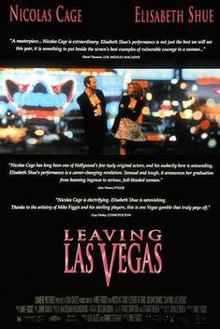
Back مغادرة لاس فيغاس (فيلم) Arabic ليڤينج لاس ڤيجاس ARZ Да напуснеш Лас Вегас Bulgarian Leaving Las Vegas Catalan Leaving Las Vegas Czech Leaving Las Vegas Welsh Leaving Las Vegas Danish Leaving Las Vegas German Αφήνοντας το Λας Βέγκας Greek Via da Las Vegas EML
| Leaving Las Vegas | |
|---|---|
 Theatrical release poster | |
| Directed by | Mike Figgis |
| Screenplay by | Mike Figgis |
| Based on | Leaving Las Vegas by John O'Brien |
| Produced by |
|
| Starring | |
| Cinematography | Declan Quinn |
| Edited by | John Smith |
| Music by |
|
Production companies | |
| Distributed by | MGM/UA Distribution Co. (United States) AFMD (France) Entertainment Film Distributors[2] (United Kingdom and Ireland) |
Release date |
|
Running time | 111 minutes |
| Countries | United States France[1] United Kingdom[1] |
| Language | English |
| Budget | $3.5–4 million[3][4] |
| Box office | $49.8 million[3] |
Leaving Las Vegas is a 1995 American drama film written and directed by Mike Figgis and based on the 1990 semi-autobiographical novel by John O'Brien. Nicolas Cage stars as a suicidal alcoholic in Los Angeles who, having lost his family and been recently fired, has decided to move to Las Vegas and drink himself to death. He loads a supply of liquor and beer into his BMW and gets drunk as he drives from Los Angeles to Las Vegas. Once there, he develops a romantic relationship with a prostitute played by Elisabeth Shue and the film shifts to include her narrative perspective. O'Brien died by suicide after signing away the film rights to the novel.[5]
Leaving Las Vegas was filmed in super 16 mm[6] instead of 35 mm film; while 16 mm was common for art house films at the time, 35 mm is most commonly used for mainstream film. After limited release in the United States on October 27, 1995, Leaving Las Vegas was released nationwide on February 9, 1996, receiving strong praise from critics and audiences with many lauding the performances from Cage and Shue, the tone, the themes and Figgis's direction and screenplay. Cage received the Golden Globe Award for Best Actor - Motion Picture Drama and the Academy Award for Best Actor, while Shue was nominated for the Golden Globe Award for Best Actress - Motion Picture Drama and the Academy Award for Best Actress. The film also received nominations for Best Adapted Screenplay and Best Director.
- ^ a b c "LEAVING LAS VEGAS: A Finding Aid to the Collection in the Library of Congress". (1995). Washington, DC: Library of Congress Manuscript Division.
 This article incorporates text from this source, which is in the public domain.
This article incorporates text from this source, which is in the public domain.
- ^ "Leaving Las Vegas (1995)". BBFC. Retrieved March 18, 2024.
- ^ a b "Leaving Las Vegas (1995) - Financial Information". The Numbers. Retrieved August 24, 2014.
- ^ Feinberg, Scott (February 1, 2022). "Oscars: Six Contenders on the Challenges and Rewards of Making 2021 Indies". The Hollywood Reporter. Retrieved February 2, 2022.
- ^ Pirina, Garin (October 28, 2015). "Leaving Las Vegas and the Writer Who Didn't Live to See It". Esquire. Retrieved May 1, 2018.
- ^ Ebert, Roger (November 5, 1995). "Cage relishes operatic role in tragic 'Leaving Las Vegas'". Chicago Sun-Times. Retrieved December 9, 2006.